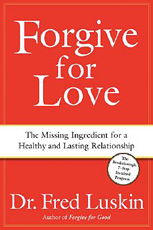Dr. Fred Luskin is the author of Forgive for Good and one of the world's leading researchers and teachers on the subject of forgiveness. He is the director of the Stanford Forgiveness Project. In this appealing and enlightening work, Luskin shows how critically important this practice is in maintaining love in intimate relationships. Research has proven that 70 percent of the issues that couples disagree about at the beginning of their relationships do not change over time. What can change and deepen is "how to use forgiveness to communicate better, manage conflict better, see the good in your partner, and allow yourself to make common mistakes."
Luskin begins with a 12 question "Forgive for Love Quiz" and then looks at some of the misconceptions about forgiveness such as confusing it with reconciliation or thinking it is the same as forgetting. He then presents these sides of forgiveness:
• "Forgiveness is for you and not for your partner.
• "Forgiveness is taking back your power from being wounded.
• "Forgiveness is taking back responsibility for how you feel now.
• "Forgiveness is about your healing and not about your partner's action.
• "Forgiveness is a trainable skill, jut like learning to throw a baseball.
• "Forgiveness helps you get control over your feelings today.
• "Forgiveness can improve your mental and physical health.
• "Forgiveness is becoming a hero instead of a victim in the story you tell about what happened.
• "Forgiveness is a choice you make.
• "Everyone can learn to forgive.
• "Forgiveness is about today and not yesterday.
• "Forgiveness is making peace when you did not get what you wanted.
• "Forgiveness is acknowledging the hurt."
The key thing to remember about relationships is that we have to work at being more forgiving. An attitude of gratitude helps, but the heart of the practice is to live without taking offense when you get a no and grieving your losses without blame. Luskin outlines the four stages that couples go through as they learn to forgive and then presents his seven steps to building a better relationship. Here are three of those steps:
• Let your partner know how blessed you are. Love is a gift which your partner is giving.
• To know them is to love them. Try to see your lover's flaws and failures with loving eyes.
• Please give yourself a break. You are just as flawed, misguided, and hurtful as your lover, and you both need a good dose of TLC.
There is plenty of sane and salutary advice here. Here's one piece of it:
"A good relationship is worth the effort of letting go of an annoying trait in your partner and being as kind as possible to this person you are connected to. . . Every spouse, whether recovering from a brutal betrayal or simply dealing with a sloppy partner, decides every day whether to get up and dance with that partner again. . . Forgiveness comes after grieving your losses, and it allows you to move forward in your relationship with happiness and a positive attitude."
